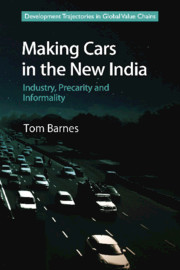Book contents
- Frontmatter
- Dedication
- Contents
- Tables, Figures and Maps
- Acknowledgments
- Abbreviations
- 1 The Limits of Industrialisation
- 2 The Auto Industry in India Today
- 3 Auto Manufacturing and the Evolution of Industrial Policy
- 4 The Transformation of Labour Relations
- 5 Auto Workers in India's National Capital Region
- 6 Work and Life at the Bottom of the Auto Supply Chain
- 7 Driving Down the ‘Low Road’?
- Appendix
- Bibliography
- Index
6 - Work and Life at the Bottom of the Auto Supply Chain
Published online by Cambridge University Press: 23 October 2018
- Frontmatter
- Dedication
- Contents
- Tables, Figures and Maps
- Acknowledgments
- Abbreviations
- 1 The Limits of Industrialisation
- 2 The Auto Industry in India Today
- 3 Auto Manufacturing and the Evolution of Industrial Policy
- 4 The Transformation of Labour Relations
- 5 Auto Workers in India's National Capital Region
- 6 Work and Life at the Bottom of the Auto Supply Chain
- 7 Driving Down the ‘Low Road’?
- Appendix
- Bibliography
- Index
Summary
This chapter focuses on the social organisation and social relations of work in small automotive manufacturing enterprises in India's National Capital Region (NCR). These enterprises are a mix of Tier-3 and Tier-4 firms. Tier-3 firms primarily manufacture automotive products for Tier-2 firms, although many produce for enterprises in different tiers of auto-based global production networks, including direct sales to the lead firm Original Equipment Manufacturers (OEMs) that dominate them. Tier-3 firms are generally much smaller than Tier-2 and Tier-1 firms when measured by production volume, sales, or number of employees.
This chapter will demonstrate that the participation of Tier-3 firms within global production networks in the NCR is usually based upon aggressive market price competition as well as strict oversight of product quality by OEMs and Tier- 1 firms. These inter-firm, commercial relations have major implications for the capacity of these smaller firms to lock themselves into global production networks, and for the organisation of work and employment relations within them.
Some of the enterprises discussed in this chapter are informal enterprises by virtue of their small number of employees. In India, firms are informal enterprises if they employ fewer than 10 workers on a regular basis, or fewer than 20 if they lack electrical power. These firms form part of the ‘unorganised sector’ (see Chapter 1). Many state regulations and labour laws do not apply to firms in the unorganised sector, such as the Factories Act 1948 which regulates working hours and conditions for regular workers in firms with 10 or more workers (the organised sector), medical insurance through the Employees’ State Insurance Corporation Act 1948 or an employment-based pension scheme through the Employees Provident Funds Act 1952.
However, many regulations, such as minimum wage laws at a national and state level, are meant to apply to all workers in firms in both organised and unorganised sectors. In the auto industry, some Tier-3 firms operate within the organised sector while others operate within the unorganised sector. In contrast, Tier-4 firms generally represent unorganised sector enterprises. Tier-4 firms tend to be own-account operations that function with a single, self-employed producer working with unpaid helpers from their family or with a small number of temporary wage workers.
- Type
- Chapter
- Information
- Making Cars in the New IndiaIndustry, Precarity and Informality, pp. 170 - 196Publisher: Cambridge University PressPrint publication year: 2018

